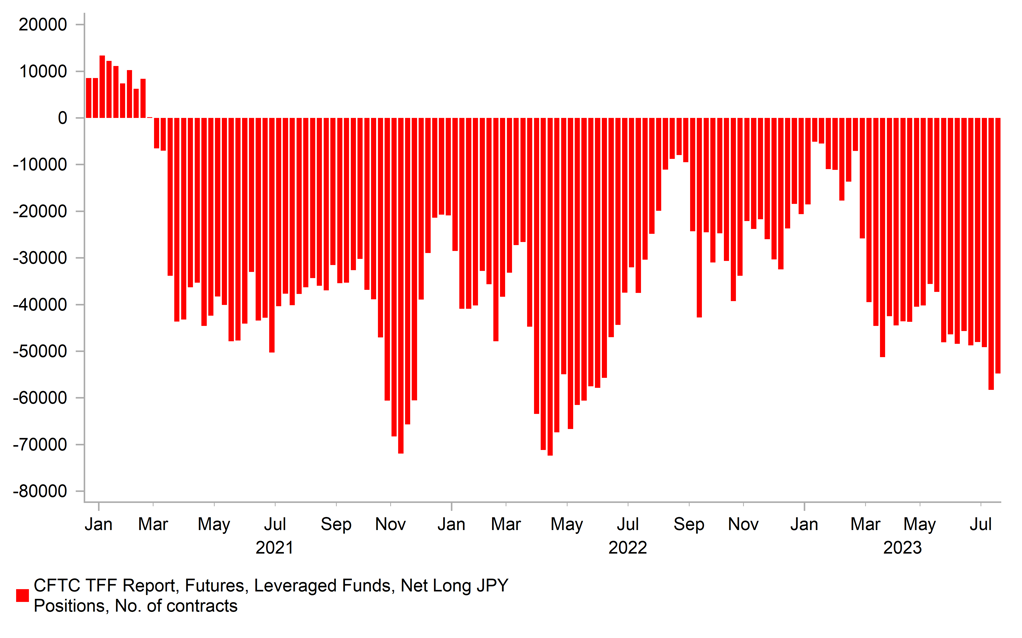An important week for CB policy updates & FX market performance
JPY: Expectations scaled back for change in BoJ’s YCC policy settings
It has been a relatively quiet start to the week for the major foreign exchange rates ahead of important central bank policy updates this week from the Fed (Wed), ECB (Thurs) and BoJ (Friday). The worst performing currencies over the past week have been the New Zealand dollar (-2.4% vs. USD) and yen (-2.0%) as the US dollar staged a modest rebound from year to date lows hit earlier in the month. The yen sell-off accelerated at the end of last week after it was reported by Bloomberg that BoJ officials see little urgent need to address the side effects of its yield curve control program at this point, though they expect to discuss the issue, according to people familiar with the matter. The BoJ analyses the costs and benefits of YCC at every meeting and will reach a final decision at its policy meeting on Friday after scrutinizing economic data and financial markets up to the last minute. According to the Bloomberg report, officials overall assessment of financial markets remains largely unchanged. They believe that the shape of the yield curve remains smooth and market functioning is not showing signs of any major issues. Many officials are also reportedly cautious that any YCC tweak at this stage would be seen as the start of tightening moves even if such an adjustment is aimed at enhancing the sustainability of the BoJ’s policy stimulus”. Officials believe that it is very important to continue with monetary easing as the economy is finally showing signs of long-sought changes including stronger wage growth, but they are still not confident that about achieving their inflation target on sustainable basis. Nevertheless, the Bloomberg report does add that a portion of the board is in favour of acting early on YCC.
The report has already had a clear impact on dampening market expectations for an adjustment of the BoJ’s YCC policy settings at Friday’s upcoming meeting policy meeting which has resulted in the sharp yen sell-off at the end of last week. It lifted USD/JPY to an intra-day high of 141.96 on Friday. The pair has now reversed over half of the correction lower during the first half of this month when it fell from an intra day high of 145.07 at the end of June to an intra-day low of 137.25 on 14th July. The renewed sell-off for the yen on Friday triggered some more verbal intervention from Japanese officials that helped to dampen yen weakness. Japan’s currency chief Masato Kanda reiterated that “excessive FX moves are undesirable” and they are “monitoring FX with a sense of urgency”. In response they are continuing to consider all options. In our latest FX Weekly (click here), we acknowledge that our conviction for a change in YCC settings as soon as this week is now lower although we still cannot rule out a move given the inevitable surprise likely involved in shifting away from YCC. Our current end-Q3 of 136.00 incorporated our view of a YCC change and implies a big drop on a surprise YCC change. The JPY risk is certainly now skewed to a bigger JPY gain than a JPY loss on an unchanged YCC announcement.
SPEC SHORT JPY POSITIONS REMAIN ELEVATED AHEAD OF BOJ MEETING

Source: Bloomberg, Macrobond & MUFG GMR
EUR: Spain election results have limited impact on euro performance
The main event over the weekend has been the general election in Spain although the results have had had limited impact on the performance of the euro. EUR/USD has continued to trade at just above the 1.1100-level after correcting modestly lower towards the end of last week. The election results have heightened political uncertainty in Spain in the near-term after the right and left both failed to secure a clear path to forming a government even though the opposition People’s party (PP) won the most seats in parliament. With all of the votes counted, the PP had won 136 seats compared to 122 seats for the Socialists. But none of the most probable coalitions will be sufficient for the PP or the Socialists to secure the 176 seats required in parliament for a majority. The PP is expected to have the first go at forming a government. If neither party is able to secure sufficient support of Congress then another election could be called alter this year. Despite the heightened political uncertainty, the election results are not expected to alter expectations that Spain’s economy to outperform other major euro-zone economies this year. If no government is formed and new elections are required, previously-agreed fiscal policies will be rolled over and remain highly accommodative. A right-leaning government could even help to lift growth forecasts for next year in light of pledges to cut taxes including on income and VAT.
KEY RELEASES AND EVENTS
|
Country |
BST |
Indicator/Event |
Period |
Consensus |
Previous |
Mkt Moving |
|
EC |
09:00 |
Manufacturing PMI |
Jul |
43.5 |
43.4 |
!! |
|
EC |
09:00 |
Services PMI |
Jul |
51.5 |
52.0 |
!! |
|
UK |
09:30 |
Manufacturing PMI |
-- |
46.1 |
46.5 |
!!! |
|
UK |
09:30 |
Services PMI |
-- |
53.0 |
53.7 |
!!! |
|
US |
14:45 |
S&P Global Composite PMI |
Jul |
53.1 |
53.2 |
!! |
Source: Bloomberg

